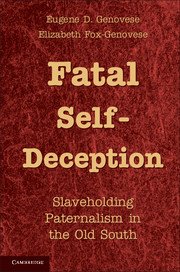6 - Guardians of a Helpless Race
Published online by Cambridge University Press: 05 June 2012
Summary
We, above all,…were guarding the helpless black race from utter annihilation at the hands of a bloody and greedy “philanthropy,” which sought to deprive them of the care of humane masters only that they might be abolished from the face of the earth, and leave the fields of labor clear for that free competition and demand-and-supply, which reduced even white workers to the lowest minimum of a miserable livelihood, and left the simple negro to compete, as best he could, with swarming and hungry millions of a more energetic race, who were already eating one another's heads off.
– E. A. PollardJustifications for slavery rested on a general belief in black racial inferiority and on a specific belief in black inability to compete with whites in the marketplace. Personal correspondence, diaries, plantation record books, agricultural periodicals, and sermons trumpeted variations of those beliefs. Proslavery spokesmen proclaimed widespread agreement in the North as well as the South that without vigilant masters, blacks would die like flies and revert to some alleged African barbarism, paganism, even cannibalism. Hence, considerations of humanity and interest required masters to rule their plantation households with an iron hand, intervening to keep blacks from hurting themselves, each other, and whites.
Blacks as well as whites commented on the frequency with which slaves sought protection from masters against the abuse of hostile whites, especially the lower-class roughs who served on slave patrols. When slaves dreaded their own master or lacked access to him or expected a severe beating, many ran off to the woods, but more than a few ran to a neighboring slaveholder to ask for his intercession, which they often got. The heroic Solomon Northup, who became a prominent abolitionist after enduring slavery in Louisiana, fled to a kind former master when his current master threatened his life. Was a slave about to be hanged for killing another slave? His master petitioned for commutation. Did a slave stand accused of raping a white woman? The master provided legal counsel, demanding an inquiry into the woman's character and reputation. Was the overseer a brute? The responses of masters varied, but he risked dismissal. In Georgia, an overseer shot a locally prominent planter who had fired him for abusing slaves. Did white mechanics try to prevent slaves from hiring their own time? Masters made sure that the laws remained largely unenforced. All such instances invited slaveholders’ self-congratulation.
- Type
- Chapter
- Information
- Fatal Self-DeceptionSlaveholding Paternalism in the Old South, pp. 111 - 130Publisher: Cambridge University PressPrint publication year: 2011



